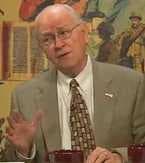David Reagan — Patmos and Ephesus (05/28/2017)
65 years after his death, burial, and resurrection, Jesus returned to this earth to the Isle of Patmos where He dictated seven remarkable letters to seven churches located in modern day Turkey. Are these letters relevant to you and me today? And if so, how? Stay tuned as we take a look at the letters.
Now, according to this passage folks, the apostle John was a prisoner of the Roman government on the Isle of Patmos when he wrote the book of Revelation. The Isle of Patmos is a barren rock about 35 miles off the western coast of Turkey. In John’s time, it was a Roman penal colony. Today it is a beautiful and enchanting place with three villages containing a total population of about 3,000 people, mainly Greeks.
All the houses and buildings on the Isle are painted bright white except a gray stone fortress-like structure on the island’s highest hill. It is the Greek orthodox monastery of St. John the Divine, which was built in 1088 AD. John was exiled to this Island in 95 AD, when he was about 90 years old. At that time he was the bishop of the church at Ephesus. Now, according to tradition, John remained on the Isle for about 18 months.
After his release, he returned to Ephesus, where, according to tradition, he died in 104 AD at the age of 99. This building, called the Monastery of the Apocalypse, is built over the site of a cave where John supposedly wrote the book of Revelation. Tradition holds that John’s most faithful disciple, a man by the name of Prochoros was sent to the Isle by the church in Ephesus to encourage John.
He became John’s scribe and was the one who actually wrote down John’s visions. A couple of years ago, I was blessed with the opportunity to visit the Isle of Patmos. I did not have a professional video crew with me, but my Media Director Don Gordoni who was traveling with me, did have a video camera and he recorded me sharing some thoughts that had occurred to me en route to the island.
I am standing on the island of Patmos, and this is a barren volcanic rock out in the Aegean Sea. It belongs to the nation of Greece and is about 37 miles off the coast of Turkey. Right behind me you see a monastery that was built in about 1088 and that monastery is located directly above a very good sized cave here on the Island of Patmos. That cave was the traditional site where John wrote the book of Revelation.
Today this Island has about 3,000 people on it, most of them in the port city below us, and they mainly live off tourism. When we were coming out here on a boat from Turkey, the cruise was above three and a half hours and during that time I had a lot of time to think about the apostle John and what he did on this island. And the thing that kept coming back to me over and over was I just kept wondering what did John think as he was on that boat coming out here.
And it suddenly occurred to me that even John the Baptist doubted when he was arrested and was facing death, and he sent messengers to say, “Are you really who you said you were?” And I got to thinking, John was no saint in the sense that he walked on water or had no temptations in the flesh, he was a human being like you and me. And I could not help but believe that as he was on that voyage which took more than three and a half hours, probably took a whole day to get over here, that there must have been many things going through his mind.
He must have been thinking, “Lord, I’m 95 years old. Lord, I’m head of the church in Ephesus. Lord, the church is under terrible persecution from Domitian, the church needs me. I’m the only apostle left alive. Why are you allowing the Roman authorities to take me to this barren island, away from everybody, in the middle of nowhere, why Lord? What good can possibly come out of this?” I can’t help but wonder if maybe that’s what he was thinking.
And then he arrived here and stayed about 18 months and sometime during that time, the Lord Jesus Christ in His glorified body appeared to him and John fell on the ground as though dead and John was so frightened that the Lord said to him some of the most comforting words in all the Bible, “Fear not John, behold. I am the first and the last, I’m the Alpha and the Omega, I was dead and now I’m alive forevermore, and I have the keys of death and Hades.”
What Jesus was saying was I am the beginning of the history, I am the end of history, I am the middle of history, I am the meaning of history, and I have overcome death and because of that I have the keys, I have the authority, over death and Hades. Over both the body and the soul and one day those who put their faith in me will have the resurrection of their body and their soul put back together with their body and will receive a glorified body to live with me forever and ever.
How that must have encouraged John. How that encourages me. How it should encourage you. And how it should encourage Christians I’m sure, for other 2,000 years as they’ve read it. Once again, God proved that He is the God of the impossible. That He can take the worst situation and bring something glorious out of it.

